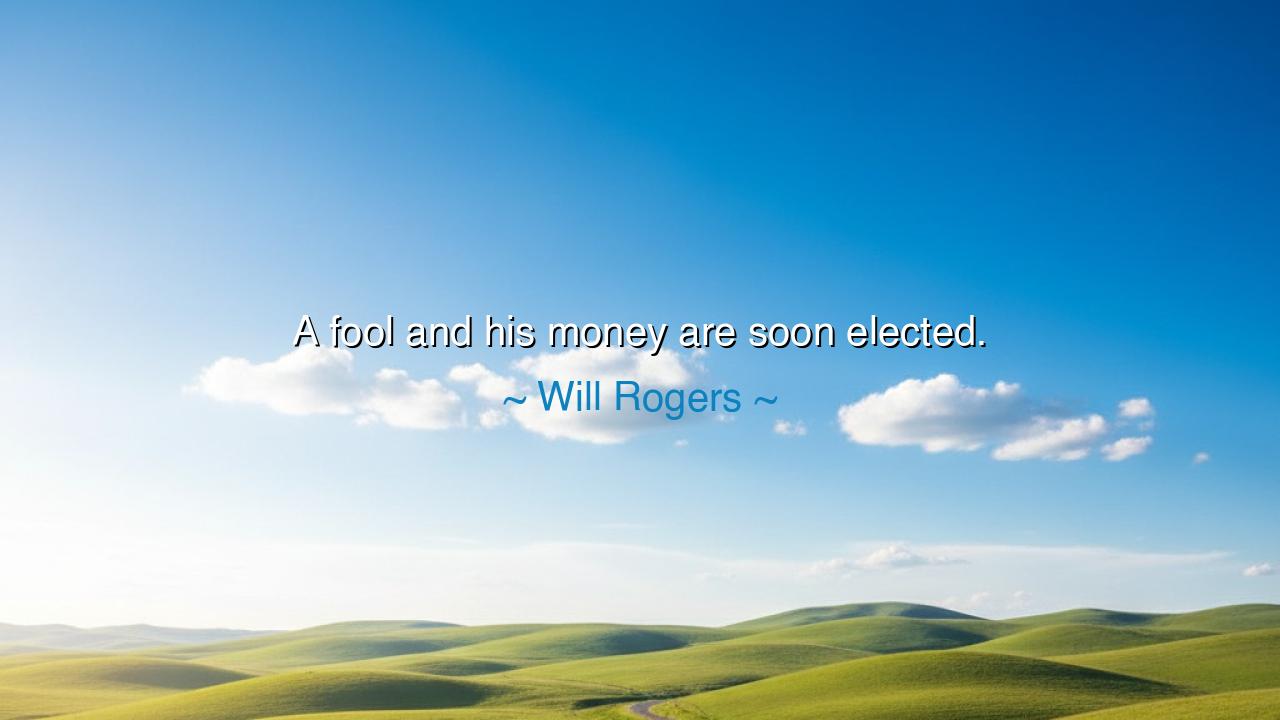
A fool and his money are soon elected.






The words of Will Rogers — “A fool and his money are soon elected.” — drip with irony and the sharp humor of a man who wielded wit as a mirror to society. Rogers, the cowboy-philosopher of America, lived in an age when politics was already deeply entangled with wealth. With this jest, he twisted an old proverb — “A fool and his money are soon parted” — into a biting commentary on democracy’s corruption, where the possession of money can raise even the most unworthy fool into the halls of power.
The meaning is timeless and sobering. Rogers unmasks the truth that in politics, money often speaks louder than wisdom, character, or service. Campaigns require funding, and influence is bought as much as it is earned. Thus, the one who is rich, though a fool, may find himself not mocked but celebrated, not cast out but elected. The people, dazzled by wealth or manipulated by spectacle, too often raise to office those unfit to rule.
History offers vivid proof. In the Gilded Age of America, many politicians were elevated less for their virtue than for their fortune. Warren G. Harding, though charming, was ill-prepared for the presidency, yet the backing of wealth and political machines carried him into power, where scandal later revealed his folly. Rogers, who lived through Harding’s era, no doubt had such examples in mind when he spoke, seeing how easily money could outweigh merit in the struggle for leadership.
The jest carries with it both warning and lament. For democracy, in its highest form, demands vigilance from the people — the refusal to be swayed by glitter or gold. Yet Rogers knew well the frailty of human nature, the tendency of citizens to mistake wealth for competence, to equate fortune with greatness. His humor strikes like a prophet’s warning disguised as laughter: if a fool with wealth can be elected, then the burden lies on the people to awaken.
Let this wisdom endure: leadership purchased with money but lacking in virtue leads only to disappointment, scandal, and decay. A nation that confuses wealth with wisdom is destined to repeat this folly, time and again. Will Rogers’ words, spoken with a grin, must be remembered with solemnity — for the future of democracy depends not on the riches of candidates, but on the discernment of the people. To choose otherwise is to enthrone the fool, and to pay dearly for his reign.






MHDo Minh Hoang
The quote seems like a cynical take on how money plays a role in who gets elected. But I also wonder—does money inherently corrupt the process, or is it more about how it’s used? Can we really expect a fair political system when wealth often gives certain people an advantage? How do we strike a balance between allowing free expression and preventing money from overshadowing meaningful dialogue and decision-making?
BPBinh Pham
Will Rogers' words have a sharp edge to them, and they feel even more relevant today when we see how money influences elections and policies. It makes me wonder: Are we often voting for the wrong reasons? Do we focus too much on a candidate’s financial backing instead of their policies or integrity? How can we shift the focus back to character and competence in leadership, rather than the ability to fund a campaign?
DSBang Do Sao
This quote made me reflect on the relationship between wealth and power. It's interesting how people with money often seem to find their way into positions of influence, regardless of their abilities. But is this always a negative thing? Can someone with money use it to bring about change and make a difference, or does it almost always lead to exploitation of the system? What do you think—does money corrupt leadership?
GBGiang Bui
Will Rogers' quote is a witty commentary on the nature of politics and money. It seems to suggest that individuals who may not be the wisest are often able to use their wealth to gain power. Is this still true today, especially with the growing influence of money in politics? How much of a role does financial power play in elections compared to actual merit or wisdom? Could this also apply to other areas of life, not just politics?